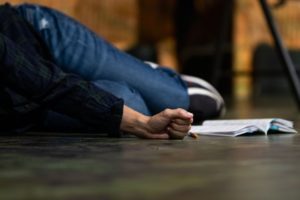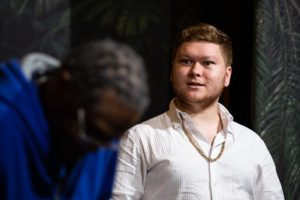7 Reasons To Seek Addiction Treatment
Substance use disorder, which is more colloquially known as drug addiction, is a serious mental...
toll free: 844.955.3042
local tel: 561.464.6505
fax: 561.450.6637
info@recointensive.com
RECO Intensive
140 NE 4th Avenue
Delray Beach, FL 33483


Photos from Water by the Spoonful rehearsals
This post is part of a series exploring issues of addiction in our community developed with local theatre company New City Players in conjunction with their upcoming production of Water By The Spoonful, which follows a group of recovering addicts as they support one another and struggle to rebuild their lives.
And while Water By The Spoonful primarily focuses on characters who are recovering from cocaine addiction, opioid abuse does eventually come into play as well, with the surge of addictions ushered in by the overprescription of oxycodone and similar opiate painkillers already in full-swing during the time period that the play takes place in 2009.
Unfortunately, matters have only gotten worse since, in no small part thanks to the role that South Florida played in the initial proliferation of opiates across not only our state but in fact our whole country. Like the more well-known story of the money-grubbing Sackler family, this is a story of greed, apathy, and people taking advantage of other people’s pain and desperation,—a story of how the overwhelming desire for capital helped unleash a demon that would ultimately be responsible for a still-growing tide of addiction and death.
While I also consulted a variety of internet articles and the 2009 documentary The Oxy Express as I got predictably lost in yet another landscape of despair, my primary source in learning about this sinister history was the book American Pain by John Temple. In great detail, it told the story of the largest and most sinister of the many “pill mills” that sprang up around Broward County, Florida as people began to realize just how much cash there was to be made in taking advantage of the public’s increasingly insatiable appetite for opioid drugs.
The book begins in late 2009 at the scene of a devastating car crash caused by the driver’s opioid intoxication before circling back to the pain clinic that had supplied her with the drugs. There, we glimpse the callous reaction of its owner Chris George, who was worried about the impact that being associated with the incident could have in alerting the authorities to the nature of their operation and impacting their bottom line.
In 2008, George had opened the South Florida Pain Clinic in Oakland Park, which is in spitting distance of New City Player’s current quarters at Island City Stage. Basically, the lack of regulations on who could establish these clinics allowed entrepreneurs like him to take advantage of doctors who were similarly cash-motivated and willing to dispense powerful opiate medications to near any patient who came in.


Photos from Water by the Spoonful rehearsals
South Florida Pain physicians would indiscriminately prescribe large quantities of the drugs, and of other desirable substances like benzodiazepines, after giving patients cursory examinations and completing just enough paperwork to pass muster. The “patients” would then either use the pills to feed their own addiction or make a pretty penny selling them on the streets.
The success and profitability of George’s enterprise inspired many imitators to open similar clinics, and drove business and attention to the ones that already existed. During the pill mill era’s peak, over 100 of the establishments could be found in Broward County—there were more pain clinics in the area than even Mcdonalds, a new one springing up as often as every three days.
Because Florida had far fewer strictures in place for limiting or monitoring the distribution of opioid drugs than most other states, and because of its abundance of pain clinics, it gradually became the primary destination for out-of-state patients seeking the pills. It became common for such patients to hop from clinic to clinic amassing multiple prescriptions, an illegal practice known as “doctor shopping.” Frequently, dealers would also “sponsor” groups of “patients” to make the trip, paying for their passage on the route that became known as the “Oxy Express” by car or plane in return for a portion of their pills.
During this era, between 2009 and 2010, 4 of every 10 thirty milligram oxycodone pills that sold in America were sold in Florida, and the vast majority of the top oxycodone prescribing doctors and clinics could be found there. The largest market for Florida pills seems to have been in southeastern states like Kentucky, Tennessee, West Virginia and Ohio, but some made it as far away as Alaska. As one Palm Beach Post article referred to it, the state became the most “reliable opioid dealer of choice” in “every state east of the Mississippi River. . . an area encompassing half the United States.”


Photos from Water by the Spoonful rehearsals
And everywhere the drug encroached, it stole lives and shattered communities. “All of the profit is down there. All of the pain is up here,” a Kentucky sheriff interviewed in The Oxy Express commented.
As the book progressed, I recognized the names of more familiar places as the clinic shifted locations a few times to expand its capacity and evade government suspicion. It moved first northward to Cypress Creek, then Boca Raton, then finally to my own home city of Lake Worth. This transition also involved a change in name from South Florida Pain to American Pain, an unexpectedly fitting one given its growing scope.
During the height of its operation, American Pain would serve 500 patients a day, as many as 80 percent of whom were out-of-staters. And in its three year life, it distributed a whopping 20 million doses of opiates.
As George and his cronies lived large, enjoying the company of strippers, cocaine, and luxury cars, at least 53 American Pain patients suffered overdoses that could be directly traced to the clinic after leaving with obscene amounts of oxy. And the affordability and accessibility of the abundant pills the clinic helped foster exposed many more people to opioid drugs than may have ever tried them otherwise, spurring countless addictions.
Of course, a problem as large as Broward County’s pill mill problem didn’t go unnoticed, and American Pain also couldn’t escape scrutiny no matter how many times it moved its storefront, especially with more and more relatives of the deceased approaching law enforcement enraged and looking for answers.
“The hardest part was holding the hands of family members that lost children — and not just one, some families lost two and three — and the first thing out of their mouths is, ‘Why are physicians allowed to do this?’ a former narcotics investigator commented in an ABCNews article.
But the old laws were ill-equipped for new crimes and a new crisis, and lawmakers were slow to react to it with new strictures, a problem potentially exacerbated by the intense lobbying of the pharmaceutical industry. So by the time media outcry got so intense that American Pain was shut down in early 2010 and new regulations mandating the monitoring of prescriptions were passed in 2011, there’s a sense in which the measure was far too little too late.
After all, ameliorating an addiction is a heck of a lot more complicated than simply cutting off drug supply, and that’s especially true of addiction to a drug as capable of fostering physical dependence as opioids. As the sudden elimination of the Florida supply lead to a rapid rise in the going street price of oxycodone, many users did not stop but instead soothed their withdrawals by turning to heroin, a more powerful drug of the same opiate class.
Foreign cartels were all too eager to pick up right where the pill mills left off, operating with a similar ruthless efficiency. Thus, as rates of prescription opiate abuse plummeted, rates of heroin abuse and overdose increased almost simultaneously, not only in Florida but in the many other regions that had been reliant on Florida supply.
But heroin is a far deadlier drug, so the switch was a costly one, with Florida’s opioid-related death rate increasing 67 percent between the peak of the pill mill crisis and 2018. Heroin, which is predominantly injected, as opposed to prescription pills that are usually ingested or crushed and snorted, also comes with the risk of giving users bloodborne diseases like hepatitis C and HIV, and new infection rates for both of these illnesses also rose rapidly as former pain pill users switched to heroin.
While an increase in the availability of harm reduction measures or an increase in state-funded treatment programs during this time could’ve reduced at least some of this deadly toll, the same lawmakers who ignored the pill mill crisis until it was too late neglected to help those who had been sentenced to addiction by their inaction. As for Chris George, who reportedly took in over 40 million dollars through his operation, he was at least eventually sentenced to a seventeen year prison term (though it was eventually whittled down to 14). Some of his top co-conspirators got jail time as well, though some of the doctors involved in the prescribing got off due to the legal complexities of proving an intent to harm rather than heal.


Photos from Water by the Spoonful rehearsals
But the epidemic that the actions George and those like him helped spur continues to rage in Broward and beyond. Pill mills were the “gas on the fire” of the already burgeoning opioid crisis, which again became even deadlier once the super-potent synthetic opioid fentanyl entered the picture starting in the mid 2010s.
Along with being up to 100 times more powerful than heroin, fentanyl is cheaper and easier to produce, and therefore far more profitable. But it’s also far more dangerous than even heroin, with a fatal dose of fentanyl potentially being as low as 3 mg to heroin’s 30 (which you can get a visual of at one of the source links listed below).
Fentanyl alone was involved in over sixty percent of the 100,000+ overdose deaths that occurred in the US last year. And it’s not only opiate users that are affected by it: fentanyl’s infiltration into the US drug supply is such that not only heroin but also cocaine, methamphetamine, and even marijuana have been sold laced with it to unsuspecting users. Even more sinisterly, the Broward County sheriff’s office recently issued a warning about fentanyl-laced pills pressed to look like legitimate prescription opiate or even non-opiate medications.
Today, Broward County has the unfortunate distinction of leading the state in number of fentanyl deaths, and Florida that of being second in overdose deaths only to California. The most recent statistics show a significant rise in opioid-related deaths and emergency room visits in Broward County between 2019 and 2020, and several recent high profile overdoses suggest that the situation likely hasn’t improved much since. As long as “it’s easier to get high than to get treatment,” as a recent New York Times article put it, and until we can do more to support those struggling with addiction and those pursuing recovery, the opioid crisis is likely to continue to cost Broward residents their sanity, their loved ones, and their lives.
What an effective solution to a problem of this magnitude might look like, I don’t know, though I wish I had more of an answer to it all besides continuing to write my silly little articles, encouraging anyone who needs addiction treatment to seek it, and encouraging you to come to our silly little play. But, it does still seem to be in some way fitting that Water By The Spoonful—which explores the devastating human toll that addiction can take—has now made its way to the place most responsible for our country’s current addiction crisis, where it can offer perhaps at least some solace to those of us affected and a chance to start community dialogue about this pressing and omnipresent issue.
Perhaps there is some inspiration to be taken, too, from the fact that many people in our community are still valiantly working to fight this epidemic and to advocate for the people affected by it, including those who work on the front lines with recovering addicts at Reco Intensive. Located in Delray Beach, Florida, our comprehensive rehabilitation program is also close in proximity to the opioid epidemic’s former epicenter.
Yet in working to empower and to heal individual patients who struggle with all types of addiction, Reco is slowly working to undo the damage and to help patients find their way to a better life and brighter future. If you or someone you love is currently struggling with addiction, you can learn more about our holistic program by contacting us online here or by calling us anytime at 844.955.3042.
And, for more information about Water By The Spoonful, New City Players, and what else we’ll be up to, feel free to follow us on Facebook or Instagram @newcityplayers or to visit https://www.newcityplayers.org/
Cross-posted at:
https://www.newcityplayers.org/thebuild/bc-broward-opioid
Rehearsal photos by Ryan Arnst (https://www.ryanarnst.com/)
Sources:
nytimes.com/2022/02/13/briefing/opioids-drug-overdose-death-toll.html
heroin.palmbeachpost.com/
statnews.com/2016/09/29/why-fentanyl-is-deadlier-than-heroin/
abcnews.go.com/amp/US/wireStory/floridas-pill-mills-gateway-opioid-crisis-64456927